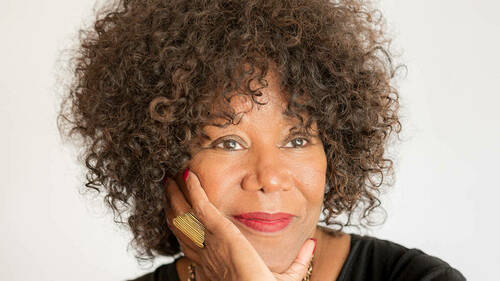
The Klau Center for Civil and Human Rights hosted Ruby Bridges via Zoom on Friday (Nov. 5) for a conversation titled “The First Big Step” at the University of Notre Dame’s DeBartolo Performing Arts Center.
Marie Lynn Miranda, the Charles and Jill Fischer Provost, welcomed attendees, saying, “We’re here to celebrate a very special event with a very special speaker. Today’s guest, Ruby Bridges, has been educating and inspiring people all of her life. At age 6, accompanied by federal marshals, and met by cheering crowds, she integrated her local elementary school in Louisiana. Her bravery inspired and changed hearts.”
Dory Mitros Durham, associate director of the Klau Center, introduced Bridges: “In 1954, the Supreme Court decided the famous Brown v. Board decision. It took five years for Ruby to be the first student to integrate William Frantz and to do it alone.”
Mitros Durham asked Bridges to share the story of how she became the first and only Black student entering New Orleans’ William Frantz Elementary School that day in 1960.
“There was a knock at the door. The NAACP was going across the country and spearheading this movement. They explained to my parents that if they were willing to send their 6-year-old to one of these newly integrated schools, that their children would have a better opportunity to have a better education and possibly college,” Bridges said.
Bridges said that in making this decision, all her mother thought about were the opportunities that she would be able to provide for her children, opportunities that her parents did not have as sharecroppers. Education was a luxury that her parents could not afford, so her mother jumped at the chance. “They knew if they really wanted to see change, that they actually had to step up to the plate to make that happen,” she said.
Bridges discussed the crowds that gathered outside the school building on her first day, and said that she did not immediately understand that they were there to protest integration and her attendance at the school. And once she got to her classroom, she realized she had a white teacher.
“I’d never seen a white teacher before. I didn’t know what to expect from her,” Bridges said. “I remember I kept thinking that she looked like the people outside, but once I got inside the classroom she filled my day with things to do. She was an amazing teacher. She showed me her heart and I knew she was different.
“I think the lesson that I took away from that classroom, that first experience, is the exact same lesson Dr. (Martin Luther) King tried to teach all of us. That we are to never look at a person and judge them by the color of their skin. That you have to judge a person by the content of their character.”
Bridges discussed her first encounter with racism at school and explained that she believes it is not children, but adults, who are responsible for the racism we see today. “We have taken racism and passed it on to our kids. That is why we are dealing with it today, 60 years later, and that’s why my work is so important.
“I want you as young people to understand if I could do what I did at 6 years old, you can make a difference in your own world, and we are counting on you to do that,” she said.
Bridges said King utilized young people during the civil rights movement to make a difference. “They got us to this point where we are now and we cannot rest. So you have to pick up the torch and you have to continue to move this country forward.”
Kate, a seventh-grader who attends a local Catholic school, asked Bridges, “What advice would you give to the young people of faith in a world where hate still seems to have a lot of power?”
Bridges said, “Prayers are something that you have to believe in. Maybe it’s not for everybody, but it’s truly what I fall back on and it definitely works for me. Continue to pray, and believe in your prayers, and believe in yourself. Try to be a good person, and decide what good you want to do in the world.”
Mitros Durham mentioned the current division around education, saying some groups have objected to Bridges’ story being taught in schools. “Were you surprised to learn that your story is controversial?” she asked.
Bridges said she was a bit surprised that people would say that. “We have to face it. We have to know our history so that we don’t repeat it,” Bridges said.
Asked if she ever wished she had a more quiet and anonymous life, Bridges said she feels like her path was chosen for her at 6 years old. “It gave my life meaning, and I don’t think that I’ll ever give that up. I do feel good about the work that I’m doing. I meet incredible people, my fan base is young people and kids, and they share their heart with me and I feel their hearts.”
“The First Big Step” is part of the lecture series, Building an Anti-Racist Vocabulary, hosted by the Klau Center for Civil and Human Rights. For more information on upcoming speakers, visit https://klau.nd.edu/initiatives/building-an-anti-racist-vocabulary/.